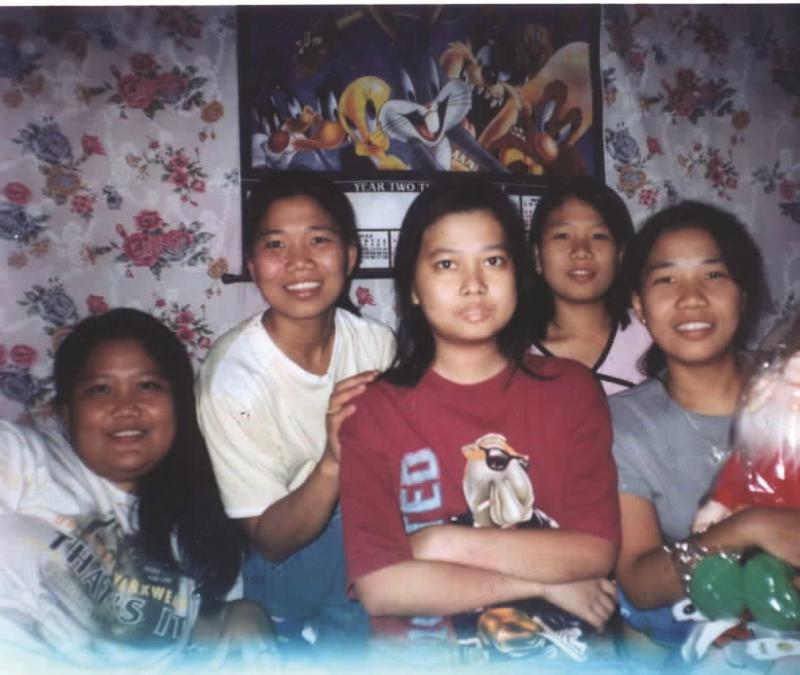Remember Me…
…when I’m gone, gone farther away,
To the land where you can no longer hold my hand
By Angelica Escarsa
Angie has been living in Ireland for more than four years now as a Columban lay missionary. Last year she lost two of her loved ones and here she shares with us how she and her family grieved and let go.

2002 was a traumatic year for our family. In August 2001 I was on retreat in Cork, Ireland, where I had gone with the Columban Lay Missionary Program (CLMP) in 1999. I was discerning about the future, as my three-year term was coming to an end. I was about to sleep when my sister Mercy phoned from home in Zambales. She cried as she told me that our sister, Deborah, had lupus. This rare disease is incurable and even led to the death of Ferdinand Marcos, former president of our country.
Why Deborah?
I was utterly devastated. I felt the whole world tumbling about me and darkness engulfing me. I didn’t know how I survived the night and didn’t know how to handle the situation. I had to be strong and be a source of hope to my family even though I was so far away. But at that moment I just wanted to hug Deborah and share her pain.
How could that be when I was on the other side of the world? When I put down the phone I felt like screaming and telling the whole world about Deborah. Why of all people should she get this strange illness?
I needed to talk to someone to ease my pain, even for a moment, but couldn’t. It was 11pm in a retreat house with everyone asleep. It was torture having no one to talk to. I could only bury my face in my pillow and cry. But it was an opportunity to entrust everything to the Lord. I asked Him to mind my sister and keep her safe. I begged Him to make the night short. I thought of the proverb, ‘A problem shared is a problem halved.’ At Mass in the morning with all the retreatants I made a petition for Deborah. Afterwards everybody approached me and sympathetically assured me of their prayers. This consoled and assured me that God would listen, would answer in His own way, maybe differently to what we wanted.
Four months later, when I thought things were all right, my mother phoned to tell me that Debbie was getting worse. She said straight out, ‘If you want to see your sister alive better come home soon.’ I felt so confused and told her I’d be home in four months, when my contract was finished. Was Debbie’s condition so bad that I had to go home right away? I asked the Lord, ‘Are you taking away my sister from us?’
Home too soon
Thank God, the Columbans gave me compassionate leave. Going home to a very ill sister wasn’t easy but I also felt intense excitement at meeting my family again. When Debbie saw me she asked me why I was home so soon, almost as if she didn’t want me to be there, but her eyes showed her delight.
The time when I had to talk to her about her condition is still vivid in my memory. I sat beside her on the bed and asked, ‘Are you afraid to die?’ It was the most difficult question I’ve ever asked anyone. Debbie was my sister. I was struck by her reply, ‘I’m not scared to die but I don’t want to leave you because I know when I leave you’ll be hurt.’
Christmas in the ICU
Deborah’s condition got so serious she had to go to the hospital. For the first time ever we spent Christmas there. As she badly needed a blood transfusion the doctors put her in the ICU. Before she was moved from the medical ward she grabbed my hand and said, ‘Ate, please forgive me for all my shortcomings; please tell the others to forgive my wrongdoings. Please forgive me.’ I couldn’t help but cry. I told her she was a beautiful person and had done nothing wrong to us. I asked her in turn to forgive the family and me for whatever wrong we had done her.
In the ICU Deborah couldn’t move her body and she needed a respirator to help her breathe. My father was devastated and cried every time he looked at her. My mother couldn’t bear to see her suffering and wouldn’t enter the ICU. When able to visit I whispered to Debbie the words that Sister Pat Zandrews, then Columban Lay Mission Program coordinator in the Philippines, told me to tell her if I had a chance, ‘Let go, Deb. Don’t worry about us. God will take care of us and will be happy to see you.’
Peace in letting go
That same day I went to an afternoon Mass in St Columban’s Church, Olongapo, within walking distance of the hospital. I was surprised I was already entrusting my sister to God, asking him, if He wanted her, not to let her suffer more. I stood in front of the statue of the Immaculate Conception asking our Blessed Mother to welcome Debbie into her loving arms and to keep her safe. I begged her to be at her side in her suffering. It wasn’t easy but in that way I eased my pain.
It was easier to let Debbie go if we believed she wasn’t going anywhere but to her Creator. Our faith in eternal life gave the family the strength to accept the reality that Debbie was leaving us and that she was going back to our Father in heaven. She could never have complete happiness in this world and had to return to the place where eternal peace and joy reign.
The nature of Debbie’s illness prepares us in some way to accept her going but the sudden death of my father the following September was very hard to comprehend.

Yet another death
After Debbie’s death I went back to Ireland to finish my term as a lay missionary. Back home again in the Philippines I decided on a second term. On 25 September 2002 I’d been back in Ireland about a month and had spent the day looking at the possibilities of the Scala Youth Ministry in Cork as my future assignment. I was excited when I got a text message from home. But the look of delight on my face changed to one of shock when I read, ‘Gel, Tatay was brought to the hospital. Hypertension.’ However, I didn’t panic as I figured it was a minor attack since I didn’t think he had any other illness. And my sister assured me it wasn’t serious. But I couldn’t relax. I prayed hard for Tatay and asked friends and colleagues to do the same.
I tried to keep calm but the same scenario had arisen again. I was on my own in Cork with no one to talk to, though my cellphone was a lifeline. It was suggested I go to Dublin, four hours away, but Claire Carey, the CLMP coordinator in Ireland, and I had a scheduled meeting with the Scala people two days later. But next morning, before I got out of bed, my sister called again to say that Tatay had only a 50/50 chance of surviving the stroke that had left him in a coma. I immediately decided to go to Dublin and while taking a shower debated whether to go home or not. But right after my shower I saw that a call had come in on my cellphone. The text said, ‘Gel, Tatay is gone.’
I was shocked to the core. I went numb but was able to scream at the top of my voice, ‘Tay! Tay! Tay!’ When I came back to my senses I phoned Claire. She asked the Mercy Sisters who owned the bungalow to come to me.
Terrified to go home
The journey on the train was tough. I was alone and holding back the tears, hoping no one would notice. The thought of going home to another funeral was terrifying. ‘How could this be happening to us? I left home only a month ago and it’s only eight months since Debbie’s death. This is getting too much to bear.’
Traveling from Cork to Dublin was long enough but how could I face nearly 20 hours on the plane to the Philippines. But I had no choice. This was happening to me. I had to be firm in my faith, believing that this was what God wanted. I would know the reason in due time.
How we surpassed the ordeal
I think the main factor that helped us accept the death of two of our loved ones in one year was our belief that God had a special reason for this. We had loved my sister and my father but God’s love for them was greater than that of anyone else. It was a test of faith, of how we could handle a situation like this, of how much we loved these people but yet could let go of them. We passed the test. We never complained to God, though there were times when we wanted to doubt his love. At the end of the day it is God whom we call on, God whom we talk to, God whom we ask for strength and refuge.
This test brought our family much closer to God. Whatever may happen to us now, we are much stronger to accept it and are ready to face any challenge we might meet in the future. I know that this isn’t the last time we’ll lose a loved one but we know it’s in accordance with God’s plan. We know too that at times like this we can count on people who walk with us in this world, our relatives and friends. Besides, death doesn’t take away our love from those who have died but is rather the beginning of our realization of how much we love them.
Even though we cannot touch or see my father Oscar and my sister Deborah, we still meet them in our spirit, we see them in our dreams, we talk to them in our minds and they will remain in our hearts, just as our Lord lives in us and is with us all the time.
